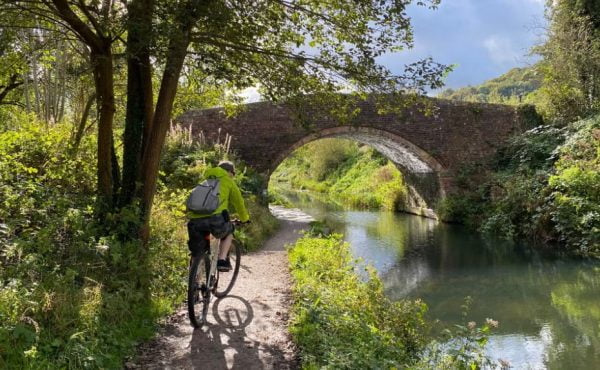They also provide great opportunities to get a history fix, courtesy of crowd-free heritage sites that aren’t necessarily accessible by road. My favourite spot on the Basingstoke Canal, for example, is Odiham Castle – the remains of a 13th-century castle built by King John, nestled in a hidden clearing set back from the water. And in Liverpool and Manchester, the huge textile mills towering over the towpaths.

The Cotswolds. Both the Stroudwater Navigation, which heads west from Stroud, and the Thames and Severn Canal, which heads east, are lined with mills. Although it’s worth noting this area wasn’t just famous for its cloth but for its dyeing industry, more specifically a red cloth used for military uniforms and coloured with cochineal, a dye made from insects. At Stroud’s Cotswold Canals Trust visitor centre (which, by the way, is a goldmine of information), paintings of Stroud in the 1800s show vast swathes of scarlet cloth laid out to dry on the surrounding hillsides.
Stroud, a market town tucked below the western escarpment of the Cotswold Hills, is a great starting point for cyclists, who can tackle either the Stroudwater Navigation or the Thames and Severn Canal.
Joining a smooth, well-maintained towpath which weaves through an area known as the Golden Valley on account of the riches once amassed by the owners of its mills – places such as Griffin Mill, which dates back to the 1500s, and Bourne Mill, which became a walking stick factory in the 1900s. It’s a historic canal that pushes its way through steep-sided valleys, and certain sections feel wonderfully remote.
The steepness of the surrounding hills wasn’t an issue for mill owners, proof of which is canal-side Chalford. There were once more than 20 mills in and around this tiny village, and workers lived in cottages which still cling to the steep slopes, connected by roads so narrow that cars struggle to navigate them. Until the 1930s, donkeys delivered groceries, and they continued to be used as occasional delivery vehicles until the early 2000s.
The Stroud Brewery, founded by Greg Pilley, who swapped conservation for craft brewing. After stints working in various African countries – including Nigeria, where he was involved with elephant conservation – Pilley opened the Stroud Brewery in 2006, vowing to rely on locally grown organic barley. Today, it’s one of just five dedicated organic breweries in the UK. Just metres from the water and with a huge beer garden, it’s a popular stop-off for cyclists, although for Pilley, it’s the local community which perhaps matters the most. Events at the brewery include performances by local bands, parish meetings and wool-spinning workshops.
The Painswick Hotel is a suitably honey-hued manor house in the village of the same name. The hotel has collaborated with local bicycle specialist Wild Carrot, and offers guests both bike hire and cycling tours. There are roaring log fires, huge baths perfect for post-cycle soaks and the hotel’s picnic lunches for cyclists – highlights include the biodegradable cutlery, tiny pots of clotted cream for the scones and homemade flapjacks – make it a brilliant crashpad for anyone exploring the Cotswolds’ canals on two wheels.
The Stroudwater Navigation, heading west and aiming for Saul Junction, where it crosses the Gloucester and Sharpness Ship Canal – the only place in the UK where two separate canals form a crossroads. Like the Thames and Severn Canal, the Stroudwater Navigation is lined with historic sites.
Near the village of Ryeford, beneath Skew Bridge, the same ornate structure which once carried the Stonehouse to Nailsworth branch of the Midland Railway. An information panel shows steam-belching engines thundering over the structure, decommissioned long ago but still standing proud. It was designed by James Ferrabee, whose family owned a nearby ironworks which produced cloth-making machines. Later, it was used to manufacture the world’s first lawnmowers, invented by Edwin Budding
the Grade II-listed Nutshell Bridge and House, a brick structure built in the 1700s as accommodation for employees, who’d use it as a lookout post for fare dodgers. Look closely at the bridge connected to the octagonal house and you’ll see grooves worn into the stone by barge ropes.

Bond’s Mill, a former cloth mill which required heavy duty protection during the Second World War, when it started producing military equipment. Like many Cotswolds mills, it became a so-called shadow factory – a back-up manufacturing plant used at a time when factories in London were vulnerable to attack. Bond’s Mill became a shadow factory for the Brentford-based Sperry Gyroscope Company, producing navigational aids for fighter pilots.
The Painswick Hotel offers log fires, huge baths, picnic lunches for cyclists, and cycle hire and tours.

